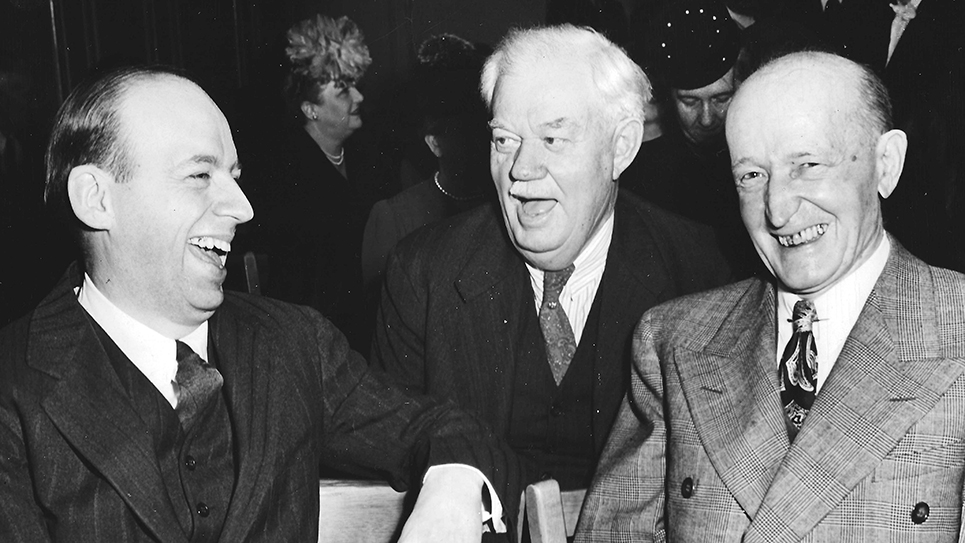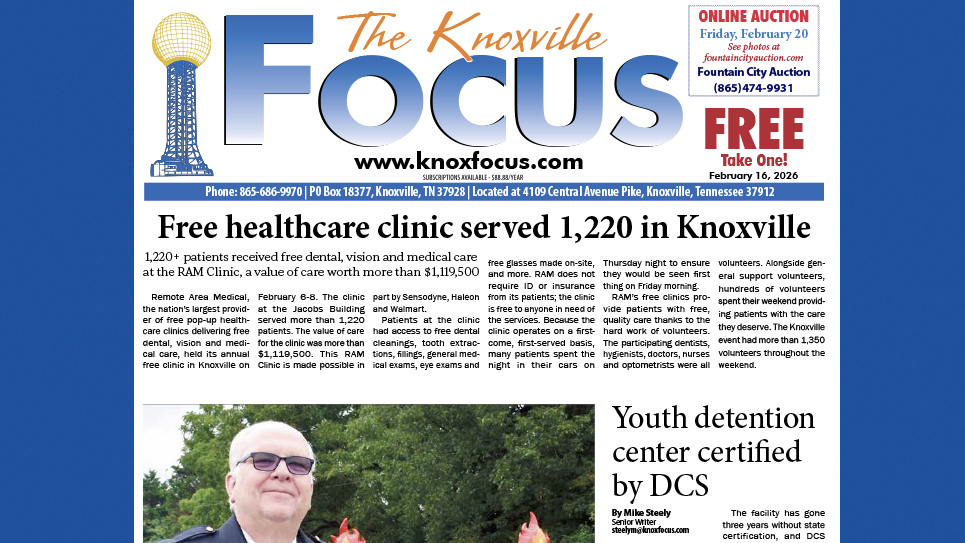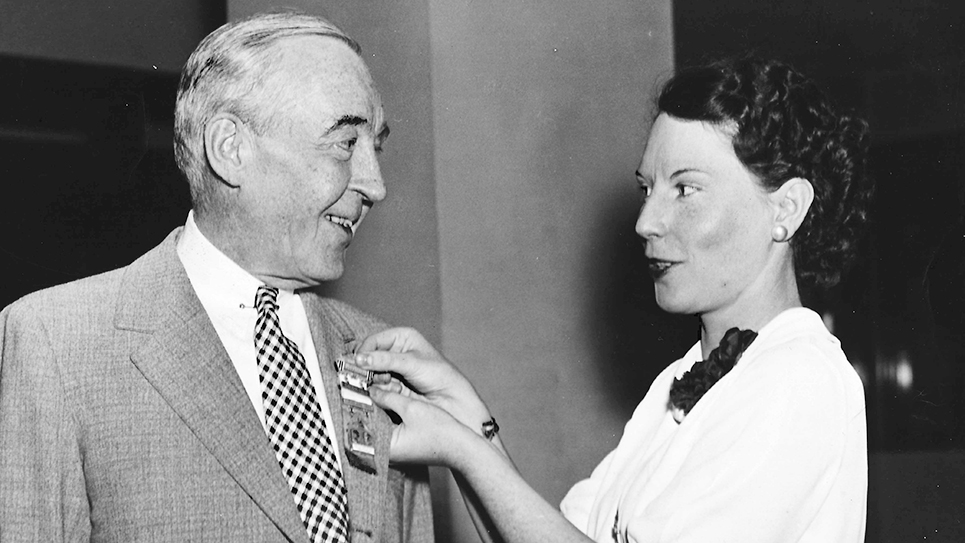John G. Townsend of Delaware
While serving as Delaware’s governor, John Gillis Townsend Jr. was a reformer; while he served in the United States Senate, he was a stalwart conservative. A highly successful business entrepreneur, John G. Townsend was a towering political figure inside the First State as Delaware’s governor during the First World and U.S. senator during the Great Depression
John G. Townsend was a man of quite humble origins who made a fortune for himself and provided jobs for others. Townsend began his working career by becoming a relief telegraph operator for the Pennsylvania Railroad in his native Maryland. That caused the young man to observe that the railroad needed cross ties and pilings. The future governor gathered up pilings and crossties and sold them to the railroad. Eventually, he took his profits and organized and operated a sawmill to provide them. Townsend moved to Selbyville, Delaware, and began growing strawberries. Eventually, the crop and his business became so large, Townsend was referred to as the “Strawberry King of America.” During his years in Washington, D.C., Townsend was well known for sending boxes of large, luscious strawberries to the members of Congress and the White House. To transport his strawberries to big cities, Townsend convinced the railroads to provide his product transportation in refrigerated cars. Even pondering what to do with surplus strawberries led to another money-making enterprise. Townsend refused to feed the surplus strawberries to the hogs or simply dump them on the open market. Walking into a store in Millsboro, Delaware, Townsend pointed to a bowl of vanilla ice cream and asked, “How would you like to have strawberry syrup on that ice cream?” The store owner said he thought it was a good idea, but where in the world would he get good strawberry syrup? John Townsend replied that he would supply it. John Townsend operated no less than twenty-three strawberry processing plants, ranging from Tennessee to Delaware.
Growing the tasty fruit caused Townsend to start his own bank, which became the second largest in Delaware. John Townsend continued to expand his agricultural holdings, raising chickens, growing soybeans and corn as well, which were feed products. Townsend also ventured into vegetable processing, and his company specialized in freezing peas and lima beans for consumption by American households. John Townsend was also known to have the largest green bean cannery in the world. Townsend was one of the largest orchard owners in the country, the other being his senatorial colleague Harry F. Byrd of Virginia.
John Townsend was also credited by some in agri-business for the discovery of the usefulness of soybeans as fertilizer. Townsend had experimented with planting hundreds of acres of “worn out land” with soybeans and immediately noticed the soil was revived once the beans were plowed under.
Townsend’s hard work and shrewdness gave him a reputation for having the “Midas touch”; every business he started became successful and made money. The life of John G. Townsend was a classic poor boy made good tale. The son of a farmer who also worked as a mechanic, Townsend’s formal education ended in grade school. Townsend was known for several traits that came in handy both in his life as a businessman and as a politician. John Townsend was a truly friendly man with a warm personality. He was also known for having the courage of his convictions
Rotund, bespectacled with a bushy head of white hair and a matching moustache, John Townsend looked like exactly what he was – – – a small-town businessman. Townsend’s growing agri-business empire became a family enterprise and provided hundreds or thousands of jobs, as well as boosting the prosperity of Selbyville, Delaware.
John G. Townsend’s success in business and interest in the Republican Party led to his nomination for the governorship in 1916. Townsend faced Democrat James H. Hughes, with whom he would later serve for four years in the United States Senate. Delaware was a genuine two-party state, and election contests were usually hard fought with either party having a chance of winning. John G. Townsend won the governor’s race while every other Republican on the statewide ballot lost. Under Governor Townsend, Delaware adopted its first laws on clean working conditions for women, pensions for mothers, child labor, workers’ compensation, and the creation of the State Highway Department during the first legislative session of his governorship. During the second session, Governor Townsend pressed the legislature and won approval of a commission for the Blind, Deaf & Mute, increased spending for highways, and created an entity which eventually became the Department of Public Welfare. Townsend later said his greatest disappointment was Delaware’s failure to ratify the Nineteenth Amendment to the Constitution, giving women the right to vote. It was left up to Tennessee to become the state that added the Nineteenth Amendment to the U.S. Constitution. It was Governor John G. Townsend who created the budget system utilized in Delaware for decades after he left the chief executive’s office.
After leaving the governor’s mansion in 1921, Townsend gave most of his attention to expanding his various business enterprises. Townsend was in Florida on a business trip in September 1928 when the Republican State Convention nominated him to run for the United States Senate to challenge Senator Thomas F. Bayard Jr. The Bayard name was one of the best-known in the state. Bayard was the son and namesake of a long-serving United States senator, ambassador to Great Britain, and secretary of state during President Grover Cleveland’s first term. The younger Bayard had won a seat in the U.S. Senate in 1922. The two senatorial candidates were a contrast in personalities and backgrounds. John Townsend had been born in Maryland and had risen from quite modest circumstances to become a very wealthy man through his business acumen. Bayard was married to a DuPont, perhaps the most famous name in Delaware; every inch an aristocrat and scion of inherited and marital family wealth.
The 1928 election was a true test of the former governor’s personal popularity with the people of Delaware. It was a great year for Republican candidates, with Herbert Hoover winning the presidency in a landslide. John G. Townsend Jr. won just over 60% of the votes cast in the Senate race.
One of the newly elected senator’s first legislative acts was to draft an amendment to give agriculture the same advantages under law as those granted to industry. It was the first act of its kind anywhere in the world and was crucial in creating the thriving agri-business in the United States. The American Academy for the Advancement of Science labeled the law “as the most important piece of legislation enacted in the 71st Congress.” Usually, new members of the Senate find their way to the committees where they have not only their interests, but also whatever expertise and experience they might have earned throughout life. That was true of John G. Townsend who chaired a committee on audit and expenditures, as well as having a seat on the Senate Banking Committee. Townsend’s business connections and amiable personality made him a prodigious fundraiser for his party, and he became the chairman of the Republican Senatorial Campaign Committee, a post he continued to hold long after he had left the U.S. Senate.
During his service as a member of the United States Senate, Townsend was awarded an honorary degree as a Doctor of Letters by the University of Delaware, which amused him no end as he liked to point out he had not gotten past grade school.
Senator Townsend ran for a second term in 1934 and once again faced Democratic attorney James J. Hughes. The senatorial contest was hard fought, with Hughes running as a supporter of President Roosevelt and the New Deal. Townsend was a critic of much of the New Deal, but was popular enough to buck the prevailing political tide and won with quite nearly 53% of the vote.
John G. Townsend was a candidate for a third term in 1940 and faced attorney James M. Tunnell, who had lost a race for the U.S. Senate in 1924. Townsend campaigned, as most incumbents do, on his record in office. The senator wryly noted a fact about politics rarely ever mentioned, saying, “Elections have been decided by those qualified to vote but who stayed at home on election day.”
Tunnell criticized Senator Townsend, whom he described as one of the “most hardshelled, die-hard conservatives in the U.S. Senate.” Jim Tunnell accused Townsend of having opposed legislation beneficial to farmers, as well as the Social Security Act. In a radio speech, Tunnell narrowed down his criticism of the senator’s record, noting “Senator Townsend had fought the New Deal program at every step of the way.”
Townsend retorted, “I make very few speeches. But I serve on more committees drafting bills than any other man in the Senate. And by serving, I mean I work.” The senator noted he had been one of those who had written the appropriation bills for defense for the last five years. As to his record in the Senate, Townsend said it had been “built not on politics but on what I believe is best for the State of Delaware and for our country.” The senator pointed to his having voted for a 33-1/3 percent increase in Social Security and ticked off a series of national bills and how they would affect the State of Delaware. It was to no avail as it was a Democratic year in the First State.
Narrowly edged out of office during a presidential election year in 1940, Townsend continued tending to his business and political interests. Townsend’s sons were all involved in his many businesses, but the former senator still kept his hand in all of them. The senator also remained in Washington, D.C., much of the time in his capacity as chairman of the Republican Senatorial Campaign Committee. John Townsend was well-liked by his former colleagues, Republicans and Democrats alike. President Harry Truman demonstrated that when he appointed former Senator Townsend as an alternate delegate to the United Nations meeting in London in 1945. Townsend spent several months in Europe touring former battlefields and viewing the carnage and destruction left by the Second World War. Upon his return to the United States, Townsend said he held out great hope for the world through the United Nations.
John G. Townsend remained highly popular with Republicans in his home state of Delaware and was offered the nomination to once again run for the United States Senate in 1946. “I’m 75 years old,” the former senator replied. “You’d better find a younger man.”
Throughout his long and productive life, John Townsend never lost interest in the Republican Party in Delaware or nationally, nor did the GOP ever lose interest in him. Townsend was routinely elected as a delegate to every Republican National Convention from 1904 through 1960, with but one exception. That occurred in 1920 when a political squabble in his own Sussex County cost the governor the party’s endorsement for a seat as a delegate. The controversy surrounded Governor Townsend’s school code, which was unpopular with some sections of Delaware. Other Republicans were angered over his stand on women’s rights and his highway program.
Eventually, the former governor and United States senator settled into a comfortable life where he came to be known as Delaware’s “Mr. Republican.” John Townsend mentored numerous GOP candidates for local, state and national offices, frequently providing excellent advice along the way.
In 1957, a big celebration was planned to fete the former senator’s eighty-sixth birthday by his family. No less than 1,000 guests from all across the country were invited to attend a dinner in Selbyville to honor Townsend. One guest was Vice President Richard Nixon, who carried birthday wishes from President Dwight D. Eisenhower.
The 92-year-old former senator was suffering from pneumonia when he was taken to the University of Pennsylvania Hospital in Philadelphia. His condition became complicated by heart failure and a recurrence of pneumonia; John Townsend died a month later.
© 2025 Ray Hill







